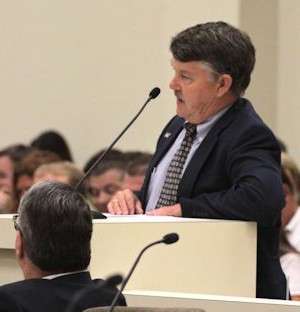RALEIGH — The room was packed at a hearing Tuesday of the House Environment Committee, but support was thin for the N.C. Senate’s additions to a regulatory reform bill that would weaken many environmental regulations.
For nearly two hours, committee members heard a litany of concerns on the bill’s air and water quality provisions and what several critics said were moves to reduce the public’s role in challenging polluters.
Supporter Spotlight

At the outset, both of the committee’s chairs, Rick Catlin, R-New Hanover, and Pat McElraft, R-Carteret, stressed that they did not support the bill as written, but wanted to get comments from the public before it was sent to a conference committee to work out differences with the Senate.
In the end, the committee recommended that the House reject the bill, which the full House did yesterday. McElraft, who urged a voted not to concur and will chair the House conferees, said she expects it to take weeks to reach a compromise.
“We’ll take our time with this, we’ll do the right thing with it,” she said.
McElraft said she expects both the regulatory bill and the budget won’t be passed before a temporary spending measure expires on Aug. 14.
Coastal Stormwater Rules
The Regulatory Reform Act of 2015 passed the Senate July 2 with more than 50 pages of revisions to state business and environmental regulations.
Supporter Spotlight
Many of the provisions had appeared in previous bills including an environmental self-audit provision, reduction of isolated wetland protections, tighter requirements on legal challenges to air toxics permits and the removal of all air quality monitors not directly required by Environmental Protection Agency.

In last year’s back and forth between the two chambers over the 2014 regulatory package, the House rejected each of those provisions and is likely to push for the same outcome this year.
At Tuesday’s hearing, while the returning controversies had their share of speakers in opposition, it was a handful of new provisions that drew the most heat.
Mac Montgomery, the former mayor of Kure Beach, urged House members not to roll back coastal stormwater rules that were adopted in 2008 after the N.C. Department of Environment and Natural Resources declared that the old rules had failed to protect shellfishing waters. The Senate has proposed reinstating those standards. Montgomery detailed his town’s successful efforts in cleaning up runoff.
“We invested in this effort because we know that clean beaches and clean water are the livelihood of a productive coastal economy,” he said. “No one wants to visit a beach when it’s shut down because the water has bacteria or dangerous chemicals in it and no one wants to buy a host or develop a business on a part of the coast where the water isn’t clean.”
Jay Styron, an oyster farmer from Cedar Island in Carteret County, also said the rollback of stormwater rules would hurt a growing oyster industry.
“We’ve got great water to build with,” he said, “and I’d just like to see that water maintained.”
But McElraft said the new rules passed have not worked in some places and had unnecessarily limited development. McElraft said it is unfair for the coastal counties to bear the burden through limiting development when pollution from upstream communities where there are fewer controls is a main cause.

Bacteria, mainly from animal waste, are the main pollutant in stormwater that closes clam and oyster beds. Research has shown that the bacteria don’t survive long in the water and likely can’t make the trip from, say, Greensboro to Wilmington along the Cape Fear River. Several important shellfishing rivers, such as the North River in Carteret County and the White Oak River in Onslow begin and end in coastal counties, yet are plagued by water contaminated with bacteria.
Both Styron and Montgomery agreed that there are some flaws in the 2008 rules. But rather than throw them out, Montgomery said he’d like to see a group formed to study the existing standards and how they are working or not and them make improvements.
The bill would re-institute the old standards but not put them in place until a study was completed on the effectiveness of the tougher standards.
Tom Reeder, an assistant secretary at DENR and part of agency team that declared the old runoff rules a failure in 2006, said he supports the bill’s requirement that a study be done on coastal stormwater before the proposed rule is changed. He said it is worth doing a study on whether there have been improvements, even though the provision requires reverting to the old, failed standards.
“The changes go into effect, but we have a chance to report back to the General Assembly next spring on what we’ve found since the new [2008] rules were adopted,” he said.
Lawsuit Challenge
Another new provision that was the subject of heavy criticism is a requirement that the state recoup legal fees from law firms representing groups and others suing the state over environmental permits and other actions.
Bob Orr, a former N.C. Supreme Court justice, said the idea puts the state and its citizens on unequal footing. “I would submit that this legislation is unfair in its application. It’s bad public policy favoring government over its citizens,” he said, adding that it is also likely unconstitutional.

Mary Penny Kelly, a former DENR lawyer who now represents small businesses, said the lawyers would have to pass the potential cost on to clients making it even less likely that the state would see legal challenges.
“It would make it almost impossible for a small business to take on the challenge of a state permit,” she said.
McElraft said she would likely work on the provision with Senate leaders, but said there is growing concern about the state’s legal tab from lawsuits like the one over the Herbert C. Bonner Bridge in Dare County.
“There is something we’ve got to do about that,” she said. “It’s costing taxpayers a lot of money — $35 million on the Bonner Bridge alone to the DOT.”
Sen. Andrew Brock, R-Davie, one of the chief sponsors of the Senate provision, also cited the $35 million in costs in making his case when the Senate debated the bill.
Late Tuesday, the Southern Environmental Law Center, which represented wildlife groups in the Bonner Bridge case, released a statement saying DOT decisions and not just legal fees were responsible for the cost.
“We think it’s important that state agencies comply with the law and that citizens can challenge state agencies when they don’t comply with the law. The inflated number that some politicians are attributing to legal fees actually reflects large, unnecessary expenditures incurred when state agencies lost lawsuits,” the SELC statement said.
Related Content
Deal Struck for New Bonner Bridge







